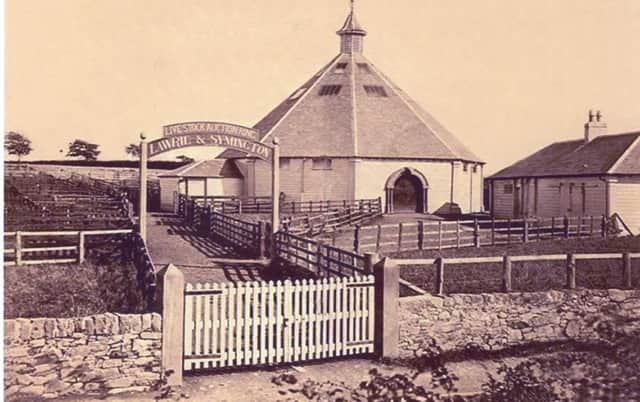Nostalgia: Why 1867 was a very good one indeed for the Royal Burgh...


Lanark also has cause to celebrate an important one-and-a-half centenary this year, that of the first livestock auction by that backbone of the local rural economy, Lanark Market operators Lawrie and Symington.
Strictly speaking, the firm was formally ‘born’ five years before that when a local auctioneer Mr John Lawrie formed a partnership with his nephew, Mr James Symington, but their business only truly got underway in its current form with that first sale on September 24, 1867.
Advertisement
Hide AdAdvertisement
Hide AdLawrie had started out in the 1840’s as a grocer and coffee and tea merchant. By the end of the 1850’s he’d acquired a shop in the High Street and the 1862 partnership with his nephew saw them first enter the agricultural economy, operating from Lanark’s old Meal Market which was then in Hope Street.
Around this period the ancient - and fairly disorganised - sale of cattle in one-to-one individual deals or at the regular burgh fairs was dying out.
Something better organised was needed to serve the growing farming economy of the Lanark area and Lawrie and Syming held that first ‘proper’ sale by auction in the year which also marked the 30th anniversary of Queen Victoria’s reign and Canada achieving nationhood,
Locally, the year 1867 also saw the arrival of the railway in Lanark and the start of the construction of the Royal Oak Hotel.
Advertisement
Hide AdAdvertisement
Hide AdIt was also the year when Lawrie and Symington moved into their own, purpose-built Market off Ladyacre Road, handily close to that new Lanark railway station and it was at this base in 1876 that the firm introduced its weekly Monday sales of stock, a tradition that carries on to this very day.
This became not only an important business day for the local farmers and dealers but also a chance for them to meet, swap news and socialise.
The growing success of the venture attracted the interest of the Elliots, a well-known Border farming family and, in 1886, they acquired the business. One of their first moves was to successfully re-introduce horse sales, an innovation which failed when first tried several years before.
The company went on to acquire semi-legendary status for these equine sales, one of Clydesdale horses in 1919 breaking all records, being held over seven days with 2,681 horses sold and the then atronomical sum of £130,000 being exchanged.
Advertisement
Hide AdAdvertisement
Hide AdUnder the Elliot stewardship, the company grew both in size and reputation and by the 1890’s it was common for over 50,000 sheep to pass through the market in just two days.
A major milestone was the appointment William Elliot as Chairman and Chief Auctioneer in 1910, posts he held until his death almost twenty years later; he lost one of his sons in the carnage of World War One but his surviving son, Walter, went on to become a very prominent politician, The Right Honorable Walter Elliot MP.
The firm expanded in the Thirties with the acquistion of Peebles Market and the highly successful implement sales came in during the Forties.
In 2004 the firm moved from its now venerable Ladyacre site to the new Lanark Agricultral Centre near the former Racecourse leading to a further expansion of its operations. The firm looks set to not only survive but thrive for another century and a half.